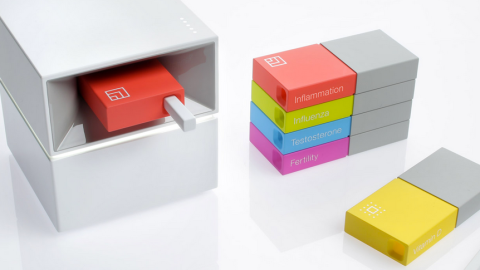First-of-a-Kind Device Allows You To Track Important Hormones Wherever You Are

Entering the market for personal health trackers is Cue – an affordable, user friendly mini-lab that allows you to test five important molecules in your body indicating fertility, influenza, testosterone, inflammation, and vitamin D levels.
“Many of us are aware that the healthcare system is a challenging way to access deep information about our bodies, with long lines, long wait times, and unpredictable costs. We believe our product will fundamentally change the way we interact with the healthcare system by allowing on demand information that you want. […] Having on demand access to important indicators of health could reshape the way we, as a society respond to a pandemic and how healthy we live our lives for ourselves and our loved ones,”
Write co-founders Ayub Khattak and Clint Sever who have been developing the technology for four years.
Cue appears to be very easy to use. It comprises of a small, neat-looking cubical device, only 3 inches tall, with a slot for cartridges. There are five different cartridges the user can buy for the five different molecules that can be tested. Once the cartridge is inserted in the device, users use the included sample wand to swab the inside of their nose for a nasal fluid sample, wipe a pad around the inside of their mouth for a saliva sample, or prick their arm for a small drop of blood for a blood sample, and insert the wand back into the cartridge. Then, in a matter of minutes, Cue performs a test via an “advanced, composite microfluidic system and state-of-the-art biosensors” that convert the biological sample into digital information sent to a phone app.
As of now, Cue can perform five different tests, with its makers promising more in the future. The first is C Reactive Protein, which is produced in the body in response to stimulus like injury or chronic illness, which many experts agree is the best overall marker of inflammation. Inflammation influences how quickly your injuries heal and the overall health of your cardiovascular system. Inflammation is also a better indicator of heart disease than LDL cholesterol, according to two large-scale studies published by the New England Journal of Medicine.
The second marker is Vitamin D, which is actually a hormone produced by the body when ultraviolet rays from sunlight strike the skin and trigger vitamin D synthesis. Two recent studies of over one million people suggest strongly that blood levels of vitamin D are a good barometer of overall health. Low levels of vitamin D can affect mood, anxiety, irritability, and can create difficulty sleeping.
The third test is for Influenza A. The CDC reports that early detection provides the option of using antiviral therapy, which can reduce symptoms and total illness time by 2 days, and reduces hospitalization and complication risks. Knowledge of a patient’s flu status at the time of the clinical encounter also has the potential to reduce additional testing and avoid unnecessary antibiotic prescription, which are prescribed in up to one-third of patients with a sole diagnosis of flu.
The fourth of the tested molecules is free testosterone – a hormone responsible for building muscle mass and strength, bone mass, sex drive and the production of red blood cells. Maintaining optimal testosterone levels can improve focus and boost energy, motivation, confidence, and sleep quality. Testoterone levels can vary during the day and frequent tracking of testosterone levels allows users to optimize their workouts.
The last marker is Luteinizing Hormone (LH), which regulates fertility and tracking it is the only method proven to indicate peak time of fertility with accuracy. A study of 221 women revealed almost 90% that tracked their hormonal fertility levels over the month successfully initiated pregnancy.
The results of the tests are sent to Cue’s phone app via Bluetooth. The app has the myriad of features one would expect, such as alerts and reminders synced with personal calendars and weather reports, custom charts that reveal important trends in the variation of hormone levels, diet and exercise recommendations, as well as flu maps that outline the spread of flu in a community.
The retail price of Cue will be $300 (limited quantity will be available for $199) and a five pack of the non-reusable cartridges will be about $20. Cue is not yet approved by the FDA, but is being pre-sold under an “Investigational Device Exemption”, which means that the first limited amount of users will provide crucial feedback as a path to the approval expected by the end of of 2015. The expected shipping date for the first batch of devices is Spring, 2015.
Photo: Cue





